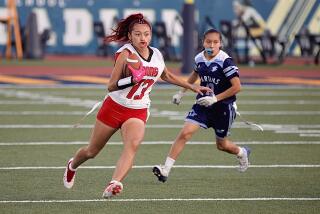Schools to Crack Down on Illicit Enrollment : Education: Problem of false ID and addresses is most serious at Buena High, which some students feel is better academically and safer than Ventura High.
The Ventura Unified School District is tightening enrollment procedures to crack down on students using false identification, forged affidavits and phony addresses to get into a school outside their area, district officials said Thursday.
While the stricter measures apply to all 23 schools in the district, the problem of students using false documentation is most serious at Buena High, said Wayne Toscas, district attendance coordinator.
Every year, the district catches a few dozen students attending the school illicitly, Toscas said, adding: “And we don’t know how many kids get away with it.”
In the fall, however, it’s going to be a lot harder to fool the district.
Alarmed that the flow of illicit students may be turning into a flood at Buena High, the district will be scrutinizing each new student’s enrollment papers and reviewing older transfers to uncover those who have falsified records, said Supt. Joseph Spirito.
In addition, Buena officials will require as many as three or four documents verifying a new student’s address, including parents’ bank and credit-card statements and property-tax receipts.
The new policy, which was approved by the Board of Trustees this week, was prompted by projections showing Buena with 2,200 students in the coming school year, contrasted with 1,700 for Ventura High.
When the district drew new boundaries a year ago, the schools were supposed to have equal enrollments. But last school year, Buena had 350 more students. This year, the gap grew to 500, about 43% larger than it was a year ago.
The district would have a dilemma if large numbers of bogus students were discovered at Buena High, Spirito said. Not only would a mass exodus be embarrassing for the district, but student repatriation would probably cause problems at other schools.
“I don’t know what we’d do,” Spirito said, suggesting that the district might have to consider allowing the students to stay at Buena.
Generally, if students are found with bogus documents, “we ask them to dis-enroll and give them a reasonable amount of time to adjust--maybe 30 days,” Toscas said. “Then we send them to the right school. It’s extremely disruptive for the student, very tough.”
Why would students break the rules to attend Buena High? Because they think it’s better academically and safer than Ventura High, district officials speculate--a view they reject.
“Over the years, the perception is that Buena is the school you go to to get into college,” Toscas said. “People perceive a difference between Buena and Ventura, but there isn’t any.”
Spirito agreed. “As many kids from Ventura get into Stanford, West Point and Harvard as from Buena,” he said.
The stabbing death of Ventura High student Jesse Strobel off campus last January raised concerns about safety there, Toscas said. In reality, however, “both campuses are tranquil.”
Although some students caught with erroneous documents weren’t out to deceive the district, Toscas said, most were intentionally dishonest. During investigations, Toscas and his staff have found altered utility bills, tampered rental agreements and forged affidavits with fake addresses.
“Some kids give addresses that don’t exist,” Toscas said, “or we go to an address, knock on the door and find out the person who lives there never heard of the student.”
It’s not always a phony document that trips a student up. Occasionally, a student “will mess up and let someone know he lives elsewhere,” Toscas said. “Sometimes, someone turns him in. That’s how we catch a lot of them. A staff member once called me and said, ‘This really hurts, but my son’s good friend shouldn’t be going to Buena.’ ”
Last year, the district dealt with the possibility that the high school football teams were recruiting players from outside their boundaries. But the issue was resolved at a meeting among athletic directors and principals, Toscas said.
“We have a strong agreement with the parties that (recruiting) is not going to occur,” Toscas said. “The penalties are too heavy. The student would be ruled ineligible and the teams would have to forfeit games.”
Spirito criticized parents who encourage and possibly conspire with their children to behave unethically.
“We talk about being honest with children and this happens,” Spirito said. “That’s the thing that bothers me the most. I’m sure the kids think their parents are doing this because it’s the only way to beat the system, but it’s not right.”
More to Read
Sign up for Essential California
The most important California stories and recommendations in your inbox every morning.
You may occasionally receive promotional content from the Los Angeles Times.










